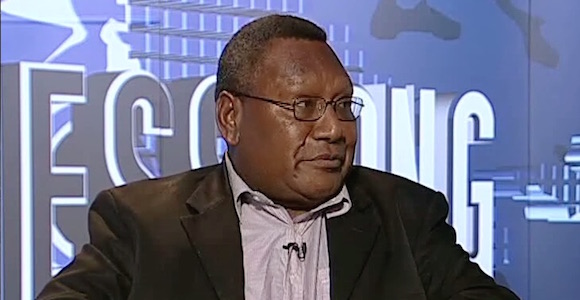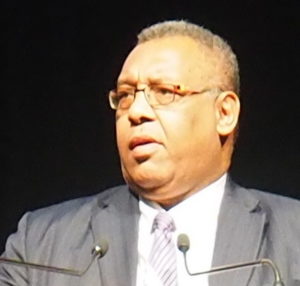The Governor of the Bank of Papua New Guinea, Loi Bakani, has told an APEC Improving Digital Financial Literacy Workshop that the use of mobile phones for financial services is increasing sharply. He said the greatest challenge to further take-up is peoples’ distrust of technology.

Central Bank Governor Loi Bakani showed that the use of mobile phones for financial services is rising.
After the implementation of ‘PNG’s 2nd National Financial Inclusion Strategy’ in the March quarter of this year, Governor Bakani said there was a 55 per cent increase in users with mobile financial services accounts and a 62.75 per cent increase in women using mobile financial service accounts.
Bakani said that globally, financial sector policymakers recognise the ‘game-changing potential of digital financial inclusion’.
He said institutions and financial regulators have the opportunity and responsibility to prepare consumers for the risks and the rewards of the digitisation of financial services.
‘The existing “bricks and mortar” banking system does not work for poor people,’ said Bakani.
‘People’s aversion to digital finance has more to do with their aversion to everything that has to do with technology.’
‘This is partly because most of their transactions are conducted in cash.
‘Handling cash transactions is costly for banks, utility companies and other institutions, which pass along the costs to their customers.
‘This takes the services beyond the financial reach of consumers.’
Trust
Bakani warned that although digital technology ‘is opening new vistas’, challenges remain.
‘Sparse populations, inconsistent network coverage, insufficient capital for building new business models, lack of trust and low technical literacy of consumers can stand in the way of success, particularly in connecting remote or underserved communities,’ he said.
‘For us here in PNG, an early and quick transition may not seem plausible because of the magnitude of the geographical and cultural divide.
‘People’s aversion to digital finance has more to do with their aversion to everything that has to do with technology.
‘Digital technologies are of particular importance to developing APEC economies such as Papua New Guinea.’
‘And this stems from their lack of trust in it. It is also partly on account of lack of comfort with technology and literacy needed to fully use these services.
‘Women often face additional barriers: less access to mobile phones, lower literacy levels, less confidence in using technology and restrictions on travel or social interaction.’
Access

Ambassador Ivan Pomaleu
Bakani’s comments on financial literacy are feeding into a broader discussion in APEC about the growing importance of digital technology.
Ambassador Ivan Pomaleu, Chair of APEC Senior Officials, commented that digital technologies ‘are of particular importance to developing APEC economies such as Papua New Guinea’.
Pomaleu believes that using smart phones for access to the internet provides an opportunity for ‘broader engagement in the market economy particularly by women, SMEs and businesses from remote rural areas in PNG.’
Working party
David Toua, PNG chair of the APEC Business Advisory Council (ABAC), says digitisation is ‘challenging all aspects of human activity: business, communication, services, research and education, the way we make and sell things.’
He says ABAC has formed a digital innovation working group, whose aim is to ‘develop business perspectives on frontier challenges to promote measures to encourage social absorption of technologies and entrepreneurship and to support a policy framework to upgrade human capital skills and training.’
Alan Bollard, Executive Director of the APEC Secretariat, says APEC is looking at 200 initiatives relating to the advent of digital technology, including: creating a digital road map, electronic commerce, blockchain and what it might offer for supply chains and artificial intelligence.
‘We are seeing some big arguments going on around the APEC table on the digital economy,’ he says.








Speak Your Mind